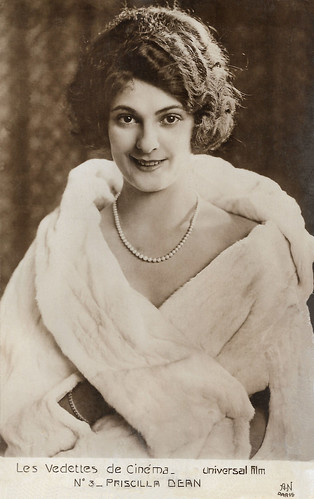
French postcard by A.N., Paris, in the Les Vedettes de Cinéma series, no. 3. Photo: Universal Film.
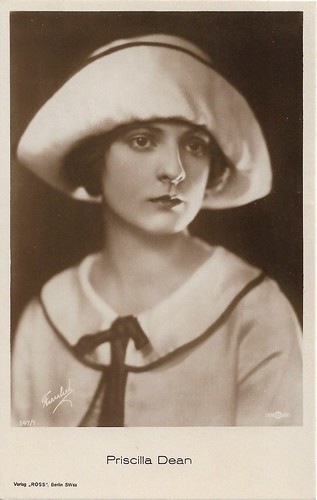
German postcard by Ross Verlag, no. 548/1, 1919-1924. Photo: Roman Freulich / Unfilman.
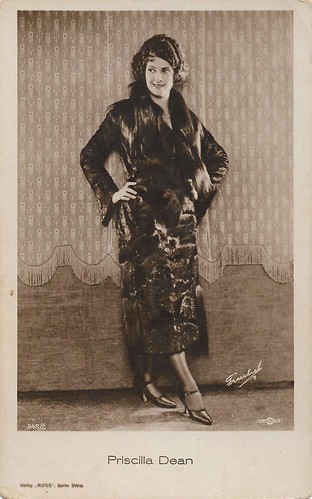
German postcard by Ross Verlag, no. 548/2, 1919-1924. Photo: Roman Freulich / Unfilman.
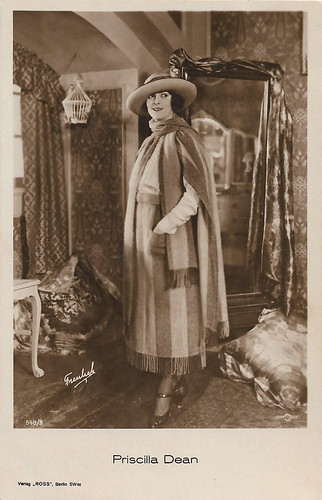
German postcard by Ross Verlag, no. 548/3, 1919-1924. Photo: Roman Freulich / Unfilman.

German postcard by Verlag Ross, no. 548/4, 1919-1924. Photo: Roman Freulich / Unfilman.
David Wark Griffith
Priscilla Dean was born in 1896 in New York City as the daughter of theatre actors. Her mother was popular stage actress May Preston Dean. From when she was four, Priscilla played in her parents' productions. As a child, she pursued a stage career at the same time as being educated at a convent school until the age of fourteen. By age 10, she was a seasoned professional.
Dean made her film debut and appeared in two short films, released in 1912. One of them was directed by D. W. Griffith for the Biograph company, A Blot under 'Scutcheon (1912). Until 1928, she contributed to 68 American silent films, including many short films directed by Jack Dillon in the mid-1910s for the Vogue Company.
From 1916 onwards, she worked for IMP, which was later merged with other film companies into Universal. She played the female lead in the Eddie Lyons & Lee Moran comedies, directed by Louis Chaudet for Nestor, another company which was merged into Universal.
In 1917 she acted in films by Lois Weber such as Even As You and I (1917) and The Hand That Rocks the Cradle (1917). Her appearance in the action serial The Gray Ghost (Stuart Paton, 1917) opposite Eddie Polo propelled her to stardom, and she began appearing in many of Universal's most prestigious productions.
Greta de Groat at Unsung Divas: "Priscilla Dean was a very unlikely diva. Her photos show a plain but cheerful-looking woman, with rather heavy features, a crooked grin, and an unfashionably curvaceous figure. But on the screen her intensity is unmatched."

German postcard by Verlag Ross, no. 518/1, 1919-1924. Photo: Unfilman.
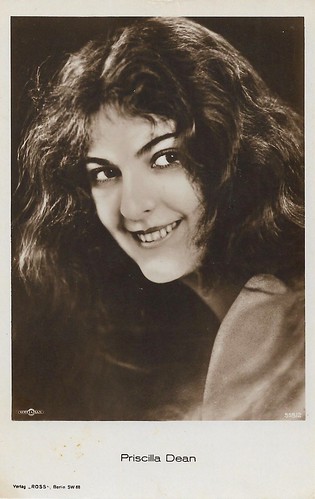
German postcard by Ross Verlag, no. 518/2, 1919-1924. Photo: Unfilman.

German postcard by Verlag Ross, no. 521/1, 1919-1924. Photo: Freulich / Unfilman.
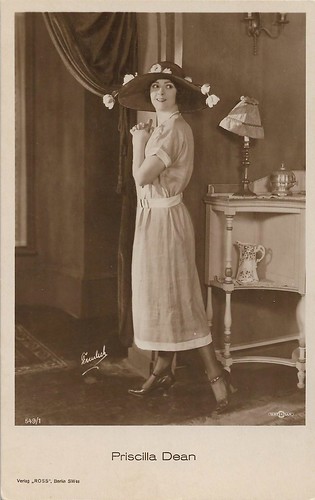
German postcard by Ross Verlag, no. 549/1, 1919-1924. Photo: Roman Freulich / Unfilman.
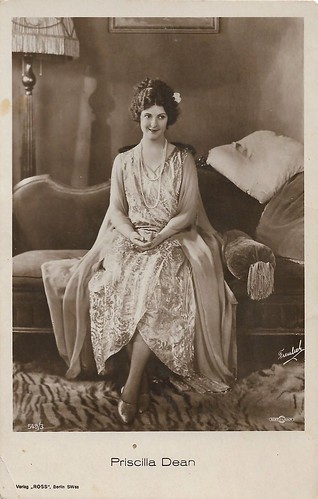
German postcard by Ross Verlag, no. 549/3, 1919-1924. Photo: Roman Freulich / Unfilman.
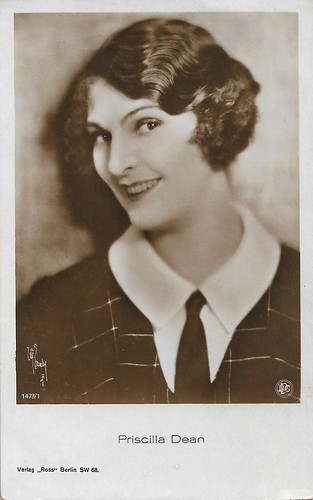
German postcard by Ross Verlag, no. 1473/1, 1927-1928. Photo: Walter F. Seely, Los Angeles / P.D.C.
Tod Browning
Priscilla Dean is best known for her participation, between 1918 and 1923, in nine Universal films by Tod Browning. These films include The Wicked Darling (1919) in which she played a pair of pickpockets with Lon Chaney, The Virgin of Stamboul (1920) with Wallace Beery, Outside the Law (1920), with Lon Chaney, Under Two Flags (1922), and White Tiger (1923), with Raymond Griffith.
Browning unleashed her talent. Her performance in Outside the Law (1920) is "startlingly fierce", according to Greta de Groat. In the French Foreign Legion melodrama Under two Flags (1922) she played Cigarette, a role re-created in a sound version by Claudette Colbert. In The Virgin of Stamboul and Outside the Law, Dean played together with Wheeler Oakman, who was also under contract at Universal and was for a time her husband.
After 1923, Dean worked for several companies: she did quite a few films at Metropolitan, a few shorts at Hal Roach such as Slipping Wives (Fred Guiol, 1927), with Laurel & Hardy, and one or two productions at Hunt Stromberg and Columbia.
The coming of sound damaged her career. By the early 1930s, she was appearing in low-budget films for small independent studios. Dean retired permanently from the screen after five talking pictures (three shorts in 1931 and two feature films in 1932). Her last film was Klondike (Phil Rosen, 1932) with Thelma Todd and Lyle Talbot. Great de Groat: "Her starring career was brief, but there was nobody else quite like her."
Priscilla Dean was first married to Wheeler Oakman but they divorced in the mid-1920s. In 1928, she married Leslie Arnold in Mexico. Arnold was divorced, but one court called this invalid, making him a bigamist, but in the end, that verdict was overruled. Lt. Leslie Arnold made history by flying around the world in 1924. Dean and Arnold remained married until his death in the 1960s. They had no children. In 1987, Priscilla Dean died at her home in Leonia, New Jersey, after the complications of a fall one year earlier. She was 91.
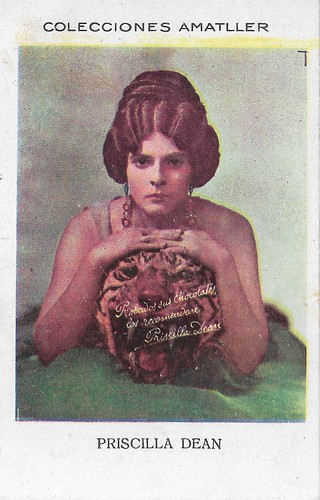
Spanish collectors card in the Collecciones Amatller Series, Series S, artist 24, no. 58, by Chocolate Amatller.

German postcard by Verlag Hermann Leiser, Berlin-Wilm., no. 3276. Photo: Unfilman.
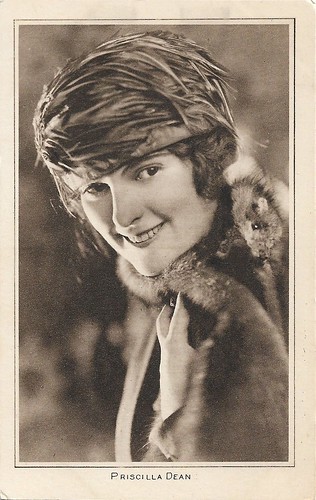
British postcard.
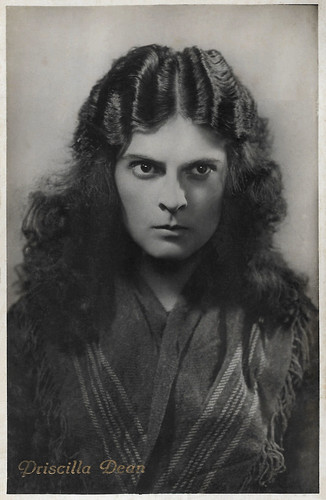
Italian postcard by G.B. Falci Editore, Milano, no. 429. Priscilla Dean in The Flame of Life (Hobart Henley, 1923).
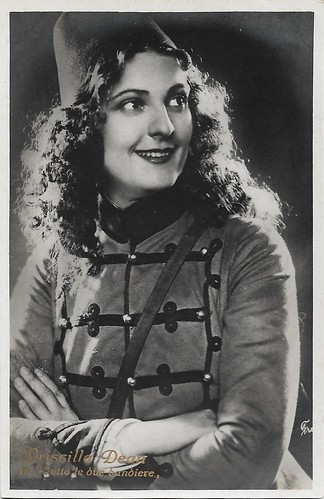
Italian postcard by G.B. Falci, Milano, no. 442. Photo: Freulich / Universal. Priscilla Dean in Under Two Flags (Tod Browning, 1922).

Austrian postcard by Iris-Verlag, no. 379. Priscilla Dean in A Cafe in Cairo (Chester Withey, 1924).
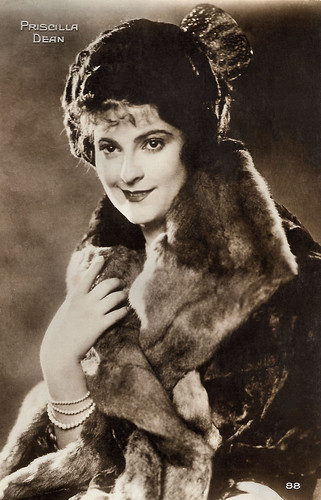
French postcard by Cinémagazine-Edition, no. 88.

Russian postcard by Goznak, Moscow, series no. 6, no. A 11833, 1928. Published in an edition of 30,000 cards.
Sources: Greta de Groat (Unsung Divas), Michael Barson (Encyclopaedia Britannica), Silent Hollywood, Los Angeles Times, Wikipedia (Italian and English) and IMDb.
No comments:
Post a Comment